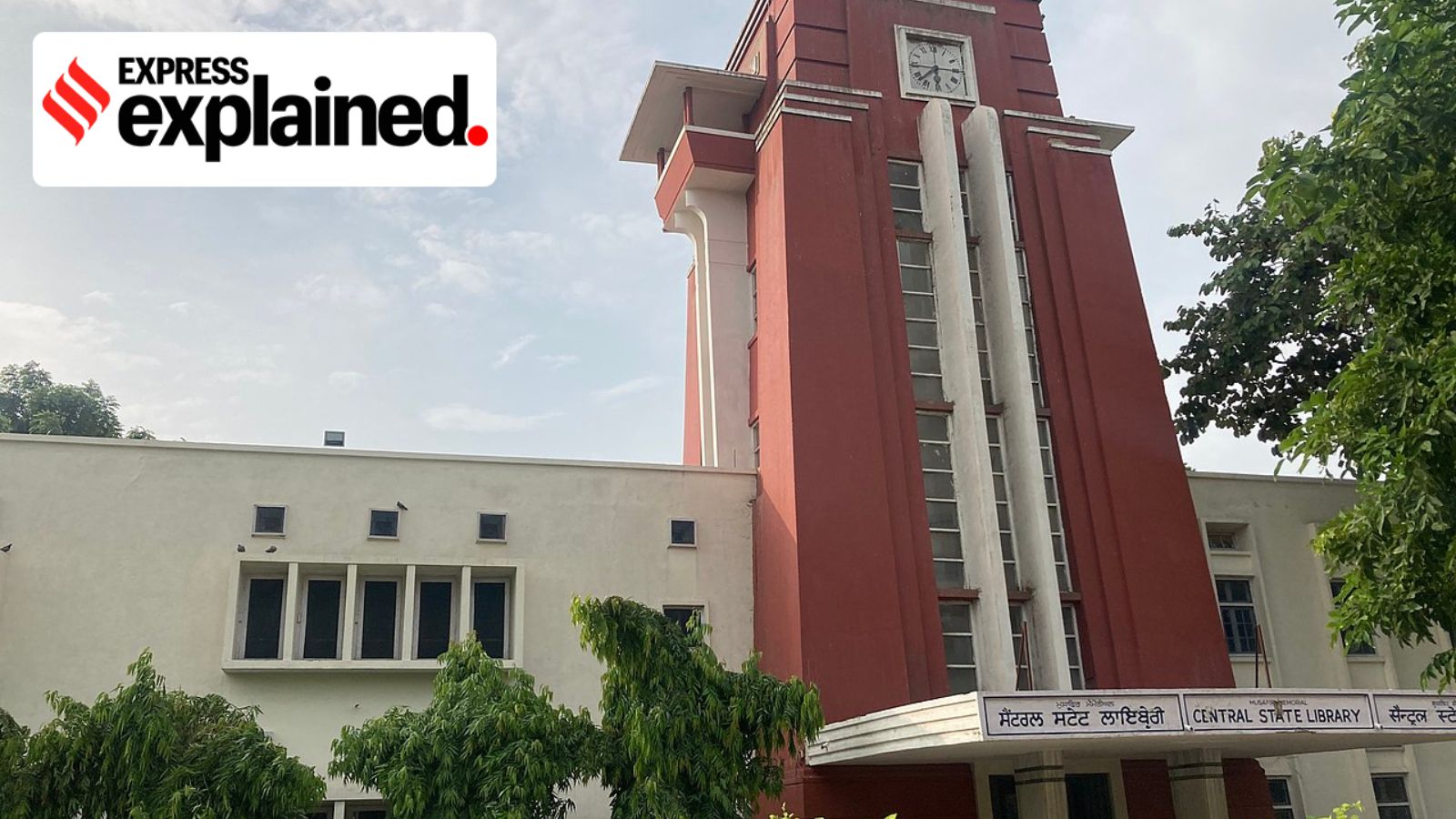Explained: Ideas behind the Punjab Public Libraries Bill and recent efforts for its revival
The bill would enable every village with a library in Punjab to be equipped with an internet-connected computer, thus providing impetus for reading. However, it has remained in limbo for long.
 Punjab currently has one state library in Patiala (seen here), 14 district libraries, 104 municipal libraries, and around 1200 rural libraries, all managed by the Directorate of Public Instructions.
Punjab currently has one state library in Patiala (seen here), 14 district libraries, 104 municipal libraries, and around 1200 rural libraries, all managed by the Directorate of Public Instructions. The Punjab Library Association has renewed its efforts to revive the ‘Punjab Public Library and Information Services Bill, 2011’ and secure its speedy implementation.
The association met with the state Education Minister Harjot Bains on Thursday (April 10), building on a meeting last month with the Governance Reforms Minister and Punjab’s AAP President Aman Arora to discuss the implementation of this act in Punjab.
Over 75 years have passed since the first Public Library Act was passed in Madras in 1948. Today, 19 states, including neighbouring Haryana, have passed Public Library Acts. Here is what to know about the proposed bill.
About the bill
The draft bill was first introduced in a 2011 cabinet meeting by then-Education Minister Sewa Singh Sekhwan and approved by then-Chief Minister Parkash Singh Badal. The bill was the culmination of efforts by the Punjab Library Association since 1948 to enforce a law governing public libraries in the state.
Sekhwan said that the bill would enable every village with a library in Punjab to be equipped with an internet-connected computer, thus providing impetus for reading, according to a 2011 report by The Indian Express.
The bill proposed a statewide library network including one state Central Library, 22 District Libraries, 141 Block Libraries, 157 Town Libraries, and 12,282 Village Libraries. This was slated to be implemented in phases over 10 years. It called for the establishment of a Punjab Public Library Governing Board, chaired by the Chief Minister, and a State Public Library Directorate to oversee operations. A dedicated State Public Library Fund was to be created to support infrastructure, staffing, and resources. The bill also encouraged financial support from national and international agencies. Existing libraries under municipal bodies, NGOs, or cooperative institutions were to be integrated into the system.
However, the onset of the 2012 legislative election delayed the implementation of the bill, according to Makhan Lal Garg, coordinator of the association and member of the Punjab Library and Librarians Council. “Since then, the SAD-BJP combine returned to power, and we have had a Congress government. Even the AAP government has completed three years in power. That draft is gathering dust within the department,” he said.
A paucity of funds
The bill proposes the funding of public libraries in a 60:40 ratio by the centre and state. The act would also allow Punjab to secure financial support from organisations like the Raja Rammohun Roy Library Foundation (RRRLF). The RRRLF’s matching scheme helps states and UTs secure grants on a matching basis, with the foundation and respective government sharing the funding typically on a 50:50 basis.
The delay in passing the act has invariably delayed the establishment of public libraries across the state.
Last year, the Central Government allocated ₹5,000 crores to establish Panchayati libraries across India. Unfortunately, Punjab did not submit any proposal to avail of these grants for setting up rural libraries in the state, said Professor Jagtar Singh, Chief Honorary Patron of Punjab Library Association (Regd).
The demands
The following demands were presented by the Punjab Libraries Association to the Education Minister:
Speedy enactment: The Punjab Public Library and Information Services Bill 2011 should be presented and passed in the Punjab Legislative Assembly at the earliest. Following this, securing the government’s assent to speedily issue its notification.
Permanent Committee on Public Libraries: The formation of a permanent Library Committee in the meantime to secure grants from RRRLF in Kolkata. The committee would be tasked with establishing and developing public libraries in towns and villages of Punjab.
Securing funding: The committee would also have to ensure the state does not miss on grants for Panchayati or rural libraries from the centre or RRRLF. Through this initiative, public libraries can be developed with the support of the National Mission on Libraries (NML) and the Raja Rammohun Roy Library Foundation, ensuring that Punjab’s rural and urban populations benefit from information services and modern technology.
The status of Punjab’s libraries
Punjab currently has one state library in Patiala, 14 district libraries, 104 municipal libraries, and around 1,200 rural libraries.
The state library and the district libraries are managed by the Directorate of Public Instructions (DPI Colleges), Punjab.
104 municipal libraries are administered by Urban Local Bodies, Punjab Government. Around 200 rural libraries are run by panchayats, NGOs, NRIs, and volunteers, while the remaining rural libraries serve merely as reading rooms.
These libraries have not been well-maintained owing to the shortage of funds. However, the Punjab government has utilised Panchayati Raj funding under the 15th Finance Commission to renovate over 180 libraries, with another 200 in the pipeline.
“But they could have got funds from the centre, had the library act been passed. The Finance Commission funds could have been used for other development works, or the library renovations could have been more elaborate with more funds,” added Garg.
- 01
- 02
- 03
- 04
- 05






































